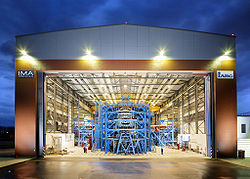 | |
Native name | Industrieanlagen-Betriebsgesellschaft mbH |
|---|---|
| Company type | GmbH (Limited liability company) |
| Industry | Aerospace, Automotive, Defense, Infocom, Security |
| Headquarters | , Germany |
| 215.4 Mio € (2019) | |
| Owner | Rudolf F. Schwarz |
Number of employees | approx. 1000 (2019) |
| Subsidiaries |
|
| Website | www |
IABG (Industrieanlagen-Betriebsgesellschaft mbH) is a German analysis and test engineering company based in Taufkirchen near Munich. [1]



